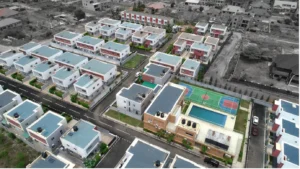Navigating the Homebuying Process in Ghana
Buying a home is a significant milestone and a substantial investment, especially in Ghana, where the real estate market is rapidly evolving. Navigating the homebuying process can be complex, but with the right guidance, it can also be a rewarding experience. This comprehensive guide will walk you through the essential steps and considerations for purchasing a home in Ghana, ensuring you make informed decisions and secure a property that meets your needs.
Understanding the Ghanaian Real Estate Market
Ghana’s real estate market has seen significant growth in recent years, driven by economic development, urbanization, and increased foreign investment. Cities like Accra, Kumasi, and Takoradi are hotspots for real estate development, offering a mix of luxury apartments, affordable housing, and commercial properties. Understanding the market dynamics, including property values, demand trends, and emerging locations, is crucial for making a sound investment.
Steps to Buying a Home in Ghana
1. Define Your Needs and Budget
The first step in the homebuying process is to clearly define your needs and budget.
Consider the following:
Location: Do you prefer an urban setting like Accra or a quieter area like Cape Coast?
Type of Property: Are you looking for a single-family home, an apartment, or a townhouse?
Size: How many bedrooms and bathrooms do you need?
Amenities: What features are important to you, such as a garden, garage, or security?
Budget: Determine how much you can afford, considering down payment, mortgage, and other costs.
2. Research the Market
Once you have a clear idea of your needs and budget, start researching the market. Use online real estate platforms, visit open houses, and consult with real estate agents to get a sense of what’s available and at what price. The Greens Estate, for instance, offers a range of eco-friendly and modern homes that cater to various preferences and budgets.
3. Secure Financing
Financing is a critical aspect of buying a home. Explore the following options:
Mortgage Loans: Many banks and financial institutions in Ghana offer mortgage loans with varying interest rates and terms. Compare offers to find the best deal.
Personal Savings: If you have sufficient savings, you might choose to buy the property outright.
Payment Plans: Some developers offer flexible payment plans, allowing you to pay in installments over a specified period.
4. Engage a Real Estate Agent
A reputable real estate agent can be invaluable in navigating the homebuying process. They have in-depth knowledge of the market, access to a broad range of listings, and can negotiate on your behalf. Ensure your agent is licensed and has a good track record.
5. Conduct Property Inspections
Before making an offer, conduct thorough inspections of the properties you’re interested in. Look for potential issues such as structural damage, plumbing problems, or electrical faults. It’s also wise to hire a professional inspector to ensure a comprehensive evaluation.
6. Make an Offer
Once you’ve found a property that meets your needs and passed inspection, make an offer. Your real estate agent can help you determine a fair price based on market value and negotiate with the seller. Be prepared for some back-and-forth before reaching an agreement.
7. Due Diligence and Legal Checks
After your offer is accepted, conduct due diligence to verify the property’s legal status. This includes:
Title Search: Ensure the seller has a clear title to the property, free from disputes or encumbrances.
Land Use: Verify that the property’s use aligns with local zoning laws.
Property Taxes: Check that all property taxes are up to date.
Engage a lawyer to assist with these checks and to prepare the necessary legal documents.
8. Sign the Sale Agreement
The sale agreement, or purchase contract, outlines the terms and conditions of the sale, including the purchase price, payment schedule, and closing date. Review the agreement carefully and ensure all conditions are acceptable before signing.
9. Pay the Deposit
Typically, a deposit is required to secure the property. This is usually a percentage of the purchase price and is paid when the sale agreement is signed. Ensure you receive a receipt and that the payment is documented in the agreement.
10. Finalize Financing and Close the Deal
Complete any remaining financing arrangements and prepare for the closing. At the closing meeting, you’ll sign the final documents, pay any remaining fees, and receive the keys to your new home. Ensure all documents are properly executed and retain copies for your records.
11. Register the Property
The final step is to register the property with the Lands Commission to officially transfer ownership. This involves submitting the necessary documents and paying the required fees. Registration provides legal recognition of your ownership and protects your rights to the property.
Tips for a Smooth Homebuying Experience
Start Early: Begin your search well in advance to allow ample time for each step.
Stay Informed: Keep abreast of market trends and legal requirements.
Budget Wisely: Factor in additional costs such as taxes, legal fees, and maintenance.
Seek Professional Advice: Consult with real estate agents, lawyers, and financial advisors.
Be Patient: The homebuying process can be lengthy, so remain patient and diligent.
Buying a home in Ghana is a significant and rewarding endeavor. By understanding the market, defining your needs, securing financing, and following the necessary steps, you can navigate the process with confidence. At The Greens Estate, we are committed to helping you find the perfect home that meets your lifestyle and budget. Explore our range of eco-friendly and modern homes designed for sustainable living and make your dream of homeownership a reality in Ghana.


